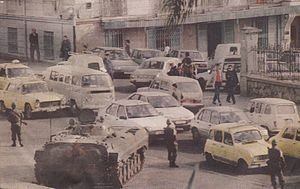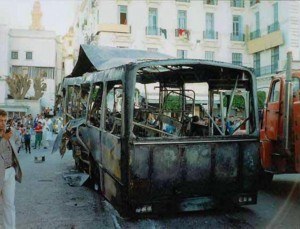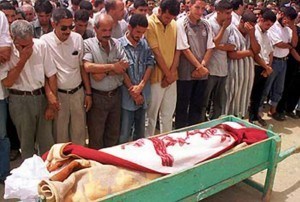Last week, we discussed Algeria’s war of independence from France in the 1950s. We will now turn our attention to another conflict in that beautiful but unfortunate country: the civil war between the government and Islamist insurgents which took place between 1990 to 1998. The civil war ended in a victory for the Algerian government.
Since the government was essentially of the same political party (the FLN) that had successfully fought for independence, Algeria’s FLN offers that rarest of examples in the history of modern conflict: an organization that both waged a successful insurgency, and suppressed an insurgency. It is critical that these conflicts be thoroughly understood. It is unfortunate that, for the most part, they are almost completely unknown in the West.
I happened to discuss the origins of the war with an Arabic-speaking Algerian laborer in Croatia in 2000. In the most basic terms, the war’s genesis can be traced to social and economic conditions that had been simmering in the country since the 1970s. Algeria had seen a population explosion in the decades after independence in 1962, but the government had failed to provide infrastructure and employment opportunities on a sufficient scale. Massive unemployment left large numbers of marginalized, angry youths with nothing to do but attend sermons by radicalized clerics.
Petroleum and gas prices had stagnated or collapsed in the 1980s and 1990s, depriving the country of significant revenue. Deep social fissures also existed in the cities: wealthy, foreign-educated youth were perceived as receiving special employment benefits to the detriment of poorer Algerians from the countryside. Widespread corruption added to public resentment of the government.
These conditions provided the tinder which would soon kindled into flames. In 1988, in an incident called the “Black October Riots,” government security forces killed an estimated 500 protesters in Algiers. It was the worst example of violence in the country since independence, and was a harbinger of things to come.
The immediate cause of armed conflict was the national parliamentary election campaign of 1991. The Islamic Salvation Front (FIS), an opposition party, was about to defeat the ruling party (FLN). Rather than see this happen, the military cancelled the elections after the first round, seized power, and removed reformist president Chadli Benjedid from office. The government then banned the FIS and jailed thousands of its members.
It was a shocking reversal, and one which passed nearly without comment in Western Europe and America. None of the Western powers wanted to see an Islamist government on the shores of the western Mediterranean, possibly stirring up trouble and exporting its ideology to European shores.
The Islamist opposition went underground and organized itself into armed groups. The Armed Islamic Movement (MIA), the Islamic Salvation Army (AIS), and the extremely hard-line Armed Islamic Group (GIA) were the major belligerents on the insurgent side.
The insurgent tactics were to attack symbols of the government: police officers, police stations, government buildings, and anyone who voiced support for the government. The mountainous regions of Algeria provided a secure base of operations for the MIA and the AIS.
One of the most disturbing features of the conflict was the indiscriminate targeting of civilians and foreigners. The GIA was largely responsible for this “innovation”, and it sprang from its idea that civilians would be forced to choose sides in the conflict. There were grisly examples of whole villages being massacred by the mid-1990s, and in many cases it was not clear who was responsible.
Insurgent groups blamed the government, or government-supported militias; the government blamed the massacres on the fanaticism of the Islamic groups. The wholesale intelligence penetration by the government of some of the insurgent groups makes the question even murkier. Who was doing what to whom is not a simple question. What now seems clear, however, is that atrocities were committed by both sides, but the majority of it must be laid at the feet of Islamist groups.
Orthodox counter-insurgency doctrine would suggest that the government would try to “win over” the hearts and minds of the population, in order to deprive the insurgents of support. In one of the basic innovations of the war, however, the government chose not to go down this route. Instead, it employed three simple but direct methods:
1. Massive intelligence collection, and penetration of insurgent groups by spies and informers.
2. The creation of a pervasive climate of fear, in which no one would know who to trust.
3. Maximum violence in targeting and liquidating insurgents and their supporters.
In this regard, the Algerian government’s tactics more resembled the counter-insurgency efforts of El Salvador’s government in the 1980s, than it did the efforts of the Sri Lankan government against the Tamil rebels in the early 2000s.
The atmosphere of repression made the average citizen fearful of even being seen in public with a bearded man, who might be taken for an Islamist sympathizer. Random roadblocks, arrests and detentions, and various government “decoy” Islamist groups, all added to the perception that the government was winning. No one knew who to trust.
As related by one writer, a bitter but honest joke gives an idea of what it was like to be in Algeria during this time:
A man is stopped by a roadblock. The hooded men ask him if he supports the government or the GIA. He replies ‘the government’ so they cut his right ear off. Shortly after, he is stopped by another roadblock of hooded men. They ask him the same question. When he replies ‘the GIA’ they cut his left ear off. The following day he goes to the doctor, who asks him which part of his face he wants sewn up first. ‘My mouth, so I cannot speak,’ he replies.
According to some analysts, the government deliberately fostered the GIA violence against civilians in the hope that it would rally domestic and international support. Through the use of decoys, infiltrators, and agents-provocateurs, it supposedly fanned the flames of Islamist violence.
This is not an easy assertion to prove one way or another. Without doubt, the successful government intelligence penetration of the insurgents contributed to its victory. But the insurgents hardly needed anyone to encourage them to commit violence: they were perfectly capable of doing it themselves.
The government also was successful in winning the political war. Neither France, Spain, nor any other European country in the vicinity was excited about the prospect of an Islamist takeover of Algeria. Algeria’s government received financial, intelligence, and moral support from European nations, while the insurgents were forced to rely on the uncertain support of worldwide Islamist networks. Islamist guerrilla forces probably never numbered more than 40,000 men by the insurgency’s high point in 1994.
The atmosphere of repression and suspicion helped the government in other ways. The Islamist groups began to splinter off and fight amongst themselves. By 1995, the AIS and the GIA began openly to fight each other; the GIA refused to negotiate with the government, while the AIS favored a dialogue to end the conflict.
With the election of President President Abdelaziz Bouteflika in 1999, the government began to wind the war down. Bouteflika brilliantly passed an amnesty law which was largely successful in causing most of the remaining insurgents to give up armed struggle. At the same time, he took care to maintain an iron grip on the security situation. This combination of reconciliation and repression worked.
Of course, some disaffected and marginalized cells of Islamists remain, which at this point are little more than terrorist branches of the Al Qaeda network. But the fact remains that the Algerian government’s strategy and tactics were successful in first containing, and then destroying, a dedicated and well-established armed insurgency.
The achievement is not an inconsiderable one, especially when we contrast it to the ineptitude of the governments of Syria and Iraq in dealing with their own insurgent problems (although it must be said in fairness that the challenges faced by Iraq and Syria are very different from what existed in Algeria).
Read More: The Algerian War Of Independence



“Democracy is great—as long as our guy wins.”—The West
True that. Though, to be fair, the Islamic Salvation Front was rather internally divided about what it thought about democracy. They were undemocratically ousted from power and denied an election victory, but many of them were quite overt about not respecting democracy themselves, and overtly so even while taking part in the democratic process.
It’s just Islam at work again. A system that encourages war, slavery, theft, rape and indiscriminate mass murder will eventually poison any nation’s collective psyche. That’s why the islamic world is such a perverted, depraved, evil mess, including the wealthy countries.
How do you explain france’s role in all of this.
France supported the government both overtly and covertly with intelligence information and at the diplomatic level. As I said, no one in Europe wanted to see an Islamist regime on the shores of the Mediterranean.
Really? NATO countries toppled Qadhafi’s Regime which was replaced by Islamists.
I think Westrn countries support Islamists when it suits them (e.g. Al Qaeda vs the Soviets in the 1980s) and fight them when they go to far (e.g. 9/11)
Yes, that’s right.
And still you come to a website which stands against the core principles of modern western societies.
I have my complaints about modern western societies.
However, even with the social justice warriors roaming around and with corporate control of our governments, the western world is still infinitely better than any Muslim country.
How many Muslim countries have you been to exactly?
Did you get a look at the homeless in many American cities? Do you know about the suburbs of France which have become no-go zones for the police? What was the last time you visited Spain and Italy?
These places are better than Qatar or the Emirates? Seriously?
Of course you would hand pick out the richer arab countries.
OldBoris said that “the western world is still infinitely better than any Muslim country.”
Did actually read his statement or are you just trolling?
France which has a massive immigrant Muslim population?
Old Boris stated: “the western world is still infinitely better than any Muslim country.”
France is part of the West so he is wrong. That’s my point.
It’ll soon be a Muslim country if it isn’t already 😛
that was america not too long ago,shit like that is why a lot of thinking folks worldwide hate america or white america
It is similar to another system. This other system is known as “democratic government” and across mostly Western civilization it has murdered some 260 million in the past century. The US government as an example killed some 3 million people in Indochina alone.
This system also encourages slavery and theft by forcing you to work for its benefit for approximately 50% of your time and will steal your resources continuously. More recently, it has begun to engage in the indiscriminate rape of innocent American civilians.
For the government system, mass murder is but one weapon in its arsenal.
After reading this I came to the same conclusion: what’s the point in fighting for one system of oppression versus another? I’m sure the guy in the story would rather have his ears back and pay taxes to the Taliban than be deaf and disfigured and pay taxes to a “democracy”
Indeed. It seemed that in order to beat the insurgency the government became worse than the insurgency. Hence my question to Quintus.
fucking slav[e] lol
One thing that isn’t mentioned here is the role that algerian jihadists returning from the 80s war in Afghanistan against the Soviet Union played in this conflict.
It is the battle-hardened algerian jihadists, trained in Afghanistan in the fight against the Soviet Union, who had the skills necessary to threaten the algerian government.
Some commenters say that when the conflict in Syria ends, jihadists returning to Europe could start a civil war there, following the same process that happened in Algeria.
Yes, that is true. Didn’t have enough space for everything, but that is a good point.
I have the impression from your article that you think what the Algerian Government did was a good thing. Do I have you wrong?
I explain the history and the details. I will leave it up to you to make your own conclusions.
And that, sir, makes you a scholar and a gentleman. Most RoK articles of this kind, by other authors, are rather overtly trying to push an agenda, or just circle-jerk and root for a specific team.
The reason I ask is that for me, it is important to know the motivations of the writer, in order to fully understand what he is writing. But also, it prevents misunderstanding prior to writing a critique.
Factual or not, there is always an underlying bias to any author and a purpose towards which he is driving.
A handful of Jihadists returning to Europe will cause a civil war? Good luck with that one.
Trained and armed by the USA you mean? Yay democracy
With “some commenters” being whom exactly? The islamophobia industry?
The same process won’t happen in Europe. Algeria is a country where almost the entire population is Muslim, and where the Islamist faction had large popular support. Neither of which is true for Europe. The returning jihadists didn’t cause the Algerian Civil War, they simply empowered one of its factions. A faction which is effectively nonexistent in Europe.
Thanks Quintus. Interesting read.
Getting really, really tired of Islam in Western countries.
Modern-day Crusades when?
you go first i am sure they are more than ready for you
Yeah but did they take KRATOM?
The Religion of Pieces.
So, we have to learn to be insurgents but also crush any further insurgencies in our movement(s).
Do we? Why?
Syria is facing an invasion financed by NATO. Now it seems that went out of control and need to take steps to prevent the fire from spreading.
http://www.voltairenet.org/article188411.html
All started when russia invaded afghanistan and thousands of muslims from all around the world went there to defend the muslim people and gain military skills and get brainwashed by radicals, as you know the notion “nationalism” is illegal in islam as all the muslim world has to be one country, this is why you see people from everywhere going to fight in syria, iraq.
in the late 80’s they came back and started a political party, and most of the algerian population voted for them, why ? because muslims must have an islamic constitution and if you don’t help then you’re a bad muslim.
The dictature-socialiste old regime got a call from the france ad the west dictating the order to cancel the election (there is prooves for that).
the islamic political party when out protesting, the regime killed hundreds of them, then they decided to fight, in what we called “going up the mountains”.
Algeria asked for help from the US and the west saying that this may be a new international terrorism problem, they said “it’s your own problem we don’t like to interfere”, at that time “islamist terrorism” wasn’t a well known thing.
anyhow, until today algeria helped france to stop tens of bombing in paris, ungrateful stupid french.
Muslims killing each other is a solution, not a problem.
it’s good to see stories about Algeria
hmm Good read
get your self cleaned befor you start talking about islam and true muslims ya pig !